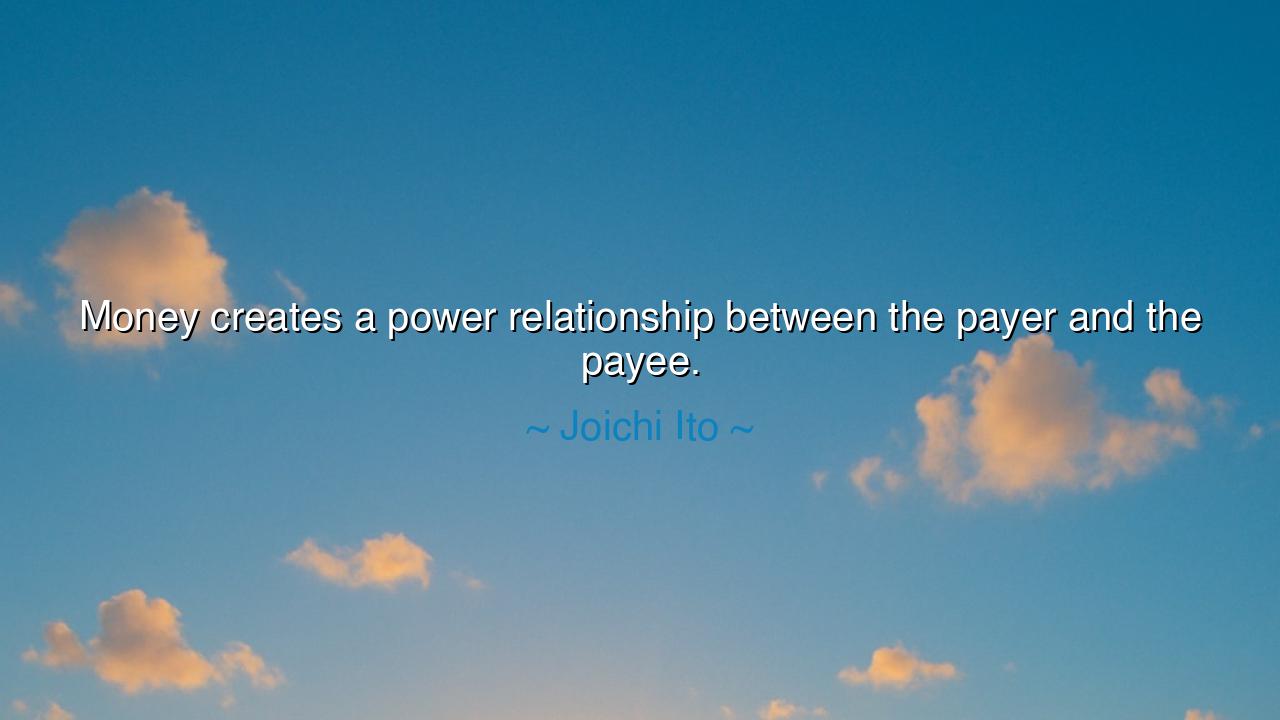
Money creates a power relationship between the payer and the






Hear, O seekers of wisdom, the words of Joichi Ito, who declared: “Money creates a power relationship between the payer and the payee.” In this saying lies a truth as old as trade itself, as sharp as the blade of justice, and as enduring as the struggles between the strong and the weak. For whenever money passes from one hand to another, it is not only goods or services exchanged, but also influence, expectation, and the delicate weight of obligation.
The meaning is profound. When one holds the money, one also holds the choice, the leverage, the silent authority to command. The payer sets the terms, and the payee, by need or by agreement, must yield. This is not merely an arrangement of commerce—it is a relationship of power. And though it may appear invisible, it shapes the dignity of the one who receives and the authority of the one who gives. Thus, Ito unmasks the truth that financial exchange is never neutral, but always carries with it the shadow of power.
The origin of such a thought flows from the heart of a man immersed in the world of technology, innovation, and capital. Joichi Ito, as an entrepreneur and venture capitalist, saw firsthand how money shaped decisions, how investors and creators were bound together not only by vision but by dependence. The giver of funds gained influence over the dream, while the receiver carried both gratitude and burden. His words are not theory, but testimony born of experience in a world where wealth flows like blood through the veins of enterprise, carrying both life and control.
History gives us countless examples. Consider the patronage system of Renaissance Italy, where artists such as Michelangelo and Leonardo da Vinci were supported by wealthy families like the Medici. Their genius was immortal, yet their work was often shaped by the will of their patrons. The Medici, as payers, held power to direct what was created, while the artists, as payees, balanced their vision against the demands of those who provided sustenance. Here we see Ito’s truth lived out: art itself was born in the tension between money and freedom, dependence and control.
The lesson is luminous: whenever money enters a relationship, recognize the power it carries. Do not believe that it is only paper or numbers, for it is a force that shapes choices, commands loyalty, and sometimes bends the will. Those who give must wield their power with humility, lest they corrupt what they touch. Those who receive must guard their dignity, lest they become enslaved by the gift. Only in mutual respect, in fairness and transparency, can such relationships remain just.
Practical wisdom flows from this. If you are the payer, let your money be a tool of empowerment, not domination. Give in ways that uplift rather than control, invest in ways that respect rather than demand. If you are the payee, accept money with awareness, knowing the strings it may carry, and strive to balance gratitude with independence. And if possible, build systems where money serves as a bridge of partnership, not as a chain of subordination.
So let Ito’s words echo through the ages: “Money creates a power relationship between the payer and the payee.” This truth cannot be denied, but it can be guided. For though money will always carry power, power need not always corrupt. It may also nurture, support, and create, if it is wielded with wisdom.
Thus, O children of tomorrow, remember: money is never empty—it is always a current of power. Learn to respect its force, to guard against its tyranny, and to use it as a servant of justice rather than a master of bondage. In doing so, you will stand free, and you will allow others to stand free beside you.






AAdministratorAdministrator
Welcome, honored guests. Please leave a comment, we will respond soon